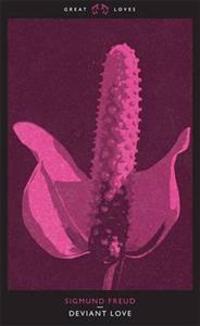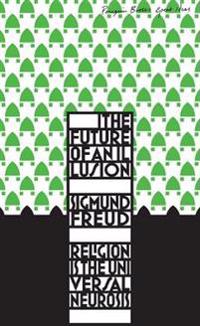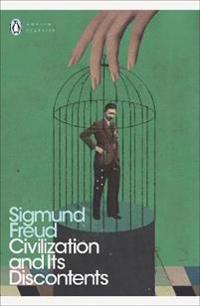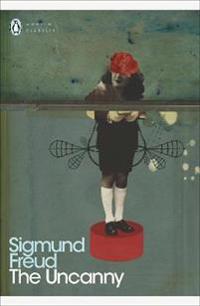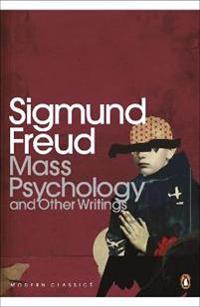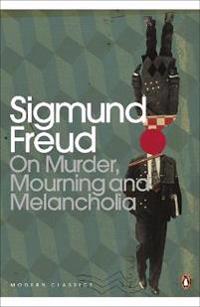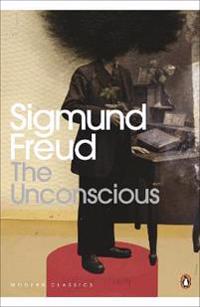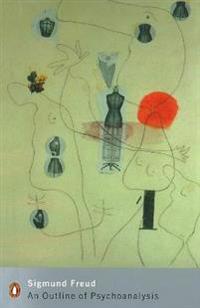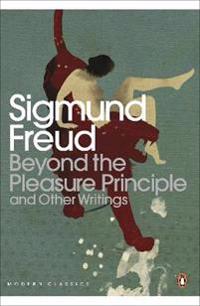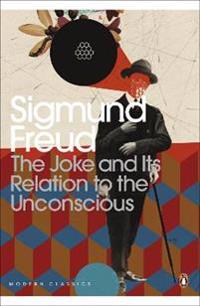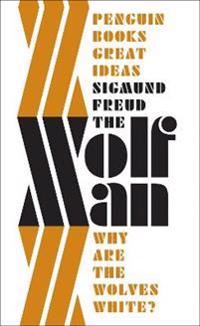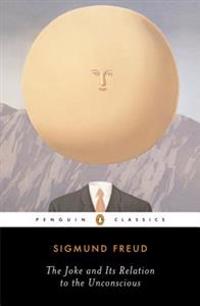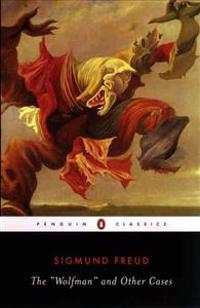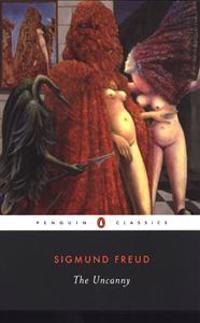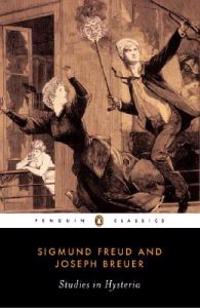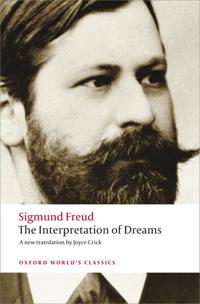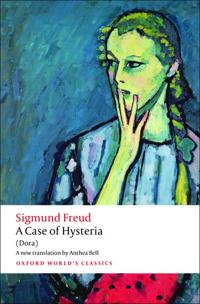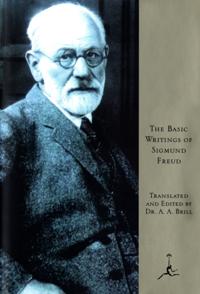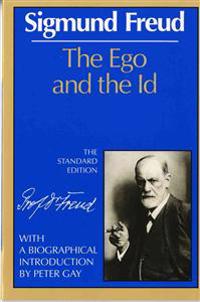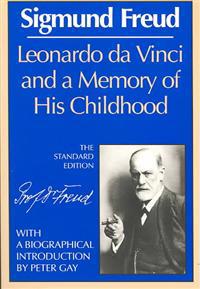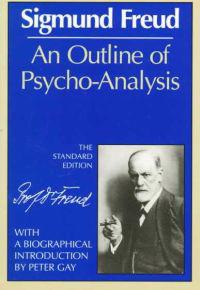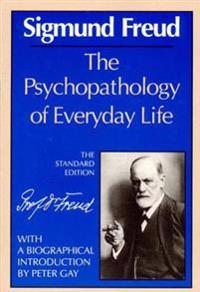Deviant Love (Pocket)
avSigmund Freud
ISBN: 9780141032863 - UTGIVEN: 200708Sigmund Freud, the founder of modern psychoanalysis, remade our view of the human mind by exploring the unconscious forces that drive us. This collection of his groundbreaking writings on the psychology of love examines the nature of desire, transgression, fantasy and erotic taboo. United by the the[...]
The Future of an Illusion (Pocket)
avSigmund Freud
ISBN: 9780141036762 - UTGIVEN: 200808This investigation of religion by greatest psychoanalyst of the twentieth-century explores the role faith can take in the life of man, what it can mean to us and why as a species we are inclined towards it. Throughout history, some books have changed the world. They have transformed the way we see o[...]
Civilization and Its Discontents (Storpocket)
avSigmund Freud, Leo Bersani
ISBN: 9780141182360 - UTGIVEN: 2002-07In what remains one of his most seminal papers, Freud considers the incompatibility of civilisation and individual happiness, and the tensions between the claims of society and the individual. We all know that living in civilised groups means sacrificing a degree of personal interest, but couldn't y[...]
The Uncanny (Storpocket)
avSigmund Freud
ISBN: 9780141182377 - UTGIVEN: 200307This title features an extraordinary collection of thematically linked essays, including "The Uncanny", "Screen Memories" and "Family Romances". Leonardo da Vinci fascinated Freud primarily because he was keen to know why his personality was so incomprehensible to his contemporaries. In this probin[...]
Mass Psychology (Pocket)
avSigmund Freud, Jacqueline (EDT) Rose, Jim (TRN) Underwood
ISBN: 9780141182414 - UTGIVEN: 2008-12Freud's religious unbeliefs are too easily dismissed as the standard scientific rationalism of the twentieth-century intellectual, yet he scorned the high-minded humanism of his contemporaries. In "Mass Psychology and Analysis of the 'I'" he explores the notion of 'mass-psychology' - his findings wo[...]
On Murder, Mourning and Melancholia (Storpocket)
avSigmund Freud
ISBN: 9780141183794 - UTGIVEN: 200509These works were written against a background of war and racism. Freud sought the sources of conflict in the deepest memories of humankind, finding clear continuities between our 'primitive' past and 'civilized' modernity. In "Totem and Taboo", he explores institutions of tribal life, tracing analog[...]
The Unconscious (Storpocket)
avSigmund Freud
ISBN: 9780141183886 - UTGIVEN: 200509One of Freud's central achievements was to demonstrate how unacceptable thoughts and feelings are repressed into the unconscious, from where they continue to exert a decisive influence over our lives. This volume contains a key statement about evidence for the unconscious, and how it works, as well [...]
An Outline of Psychoanalysis (Storpocket)
avSigmund Freud
ISBN: 9780141184043 - UTGIVEN: 2003-07This title is one of fifteen volumes in the new Freud series commissioned for Penguin by series editor Adam Phillips. It is part of a plan to generate a new, non-specialist Freud for a wide readership, which goes way beyond the institutional/clinical market and presents material to the reader in a n[...]
Beyond the Pleasure Principle (Storpocket)
avSigmund Freud
ISBN: 9780141184050 - UTGIVEN: 200307A collection of some of Freud's most famous essays, including "On The Introduction of Narcissism", "Remembering, Repeating and Working Through", "Beyond the Pleasure Principle", "The Ego and the ID" and "Inhibition, Symptom and Fear".[...]
The Joke and Its Relation to the Unconscious (Storpocket)
avSigmund Freud
ISBN: 9780141185545 - UTGIVEN: 200211Building on the crucial insight that jokes use many of the same mechanisms he had already discovered in dreams, Freud developed one of the richest and most comprehensive theories of humor that has ever been produced. Jokes, he argues, provide immense pleasure by allowing us to express many of our de[...]
The 'Wolfman' (Häftad)
avSigmund Freud
ISBN: 9780141192208 - UTGIVEN: 201008This is Freud's groundbreaking study of a wealthy young Russian man, subject to psychotic episodes and neuroses. Through the patient's dream of childhood wolves, Freud was able to determine his real problem - that of infantile neurosis brought about by a sexual complex and an Oedipal fixation. "Grea[...]
Civilization And Its Discontents (Inbunden)
avSigmund Freud
ISBN: 9780141395890 - UTGIVEN: 2014-10Written in the decade before Freud s death, Civilization and Its Discontents may be his most famous and most brilliant work. It has been praised, dissected, lambasted, interpreted, and reinterpreted. Originally published in 1930, it seeks to answer several questions fundamental to human society and [...]
The Joke and Its Relation to the Unconscious (Häftad)
avSigmund Freud, John Carey
ISBN: 9780142437445 - UTGIVEN: 200306Why do we laugh? The answer, argued Freud in this groundbreaking study of humor, is that jokes, like dreams, satisfy our unconscious desires. The Joke and Its Relation to the Unconscious explains how jokes provide immense pleasure by releasing us from our inhibitions and allowing us to express sexua[...]
The "Wolfman" and Other Cases (Häftad)
avSigmund Freud
ISBN: 9780142437452 - UTGIVEN: 200306When a disturbed young Russian man came to Freud for treatment, the analysis of his childhood neuroses--most notably a dream about wolves outside his bedroom window--eventually revealed a deep-seated trauma. It took more than four years to treat him, and "The Wolfman" became one of Freud's most famo[...]
The Uncanny (Häftad)
avSigmund Freud, Adam Phillips
ISBN: 9780142437476 - UTGIVEN: 200309Freud was fascinated by the mysteries of creativity and the imagination. The groundbreaking works that comprise "The Uncanny" present some of his most influential explorations of the mind. In these pieces Freud investigates the vivid but seemingly trivial childhood memories that often "screen" deepl[...]
Studies in Hysteria (Häftad)
avSigmund Freud, Joseph Breuer
ISBN: 9780142437490 - UTGIVEN: 200406Hysteria--the tormenting of the body by the troubled mind--is among the most pervasive of human disorders; yet, at the same time, it is the most elusive. Freud's recognition that hysteria stemmed from traumas in the patient's past transformed the way we think about sexuality. Studies in Hysteria is [...]
The Interpretation of Dreams (Häftad)
avSigmund Freud
ISBN: 9780199537587 - UTGIVEN: 200808This groundbreaking new translation of The Interpretation of Dreams is the first to be based on the original text published in November 1899. It restores Freud's original argument, unmodified by revisions he made following the book's critical reception which included, under the influence of his ass[...]
A Case of Hysteria (Häftad)
avSigmund Freud
ISBN: 9780199639861 - UTGIVEN: 2013-04'I very soon had an opportunity to interpret Dora's nervous coughing as the outcome of a fantasized sexual situation.' A Case of Hysteria, popularly known as the Dora Case, affords a rare insight into how Freud dealt with patients and interpreted what they told him. The 18-year-old 'Dora' was sent [...]
Basic Writings of Sigmund Freud
ISBN: 9780307824011 - UTGIVEN: 2015-06This classic edition of The Basic Writings of Sigmund Freud includes complete texts of six works that have profoundly influenced our understanding of human behavior. The Basic Writings of Sigmund Freud is presented here in the translation by Dr. A. A. Brill, who for almost forty years was the sta[...]
The Ego and the Id (Pocket)
avSigmund Freud, James Strachey, Peter Gay
ISBN: 9780393001426 - UTGIVEN: 196204Presents Freud's psychoanalytical treatise on the divisions of the mind and their interrelations
Jokes and Their Relation to the Unconscious (Pocket)
avSigmund Freud
ISBN: 9780393001457 - UTGIVEN: 1963-06-01Leonardo Da Vinci and a Memory of His Childhood (Häftad)
avSigmund Freud, James Strachey
ISBN: 9780393001495 - UTGIVEN: 199001.
An Outline of Psycho-Analysis (Pocket)
avSigmund Freud, James Strachey, Peter Gay
ISBN: 9780393001518 - UTGIVEN: 198910Freud approved the overall editorial plan, specific renderings of key words and phrases, and the addition of valuable notes, from bibliographical and explanatory. Many of the translations were done by Strachey himself; the rest were prepared under his supervision. The result was to place the Standar[...]
The Psychopathology of Everyday Life (Inbunden)
avSigmund Freud
ISBN: 9780393006117 - UTGIVEN: 1971-04Along with the "Introductory Lectures on Psycho-Analysis, " the present text remains one of Freud's most widely read. It is filled with anecdotes, many of them quite amusing, and virtually bereft of difficult technical terminology. And Freud put himself on the line: numerous acts of willful forgetti[...]
Beyond the Pleasure Principle (Häftad)
avSigmund Freud, James Strachey, Peter Gay
ISBN: 9780393007695 - UTGIVEN: 199004.

